|
|
|
Sort Order |
|
|
|
Items / Page
|
|
|
|
|
|
|
| Srl | Item |
| 1 |
ID:
104095
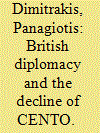

|
|
|
|
|
| Publication |
2009.
|
| Summary/Abstract |
The Central Treaty Organization (CENTO) is considered the failed West-inspired alliance of the Cold War that was dissolved in 1979 after the fall of the Shah. Britain found the regional member states, Iran, Turkey and Pakistan, unwilling to focus on a common deterrent strategy or assign forces to this alliance. For two decades Pakistan wanted to turn CENTO against India, but London resisted any policy that could offend New Delhi. Eventually Whitehall admitted that this organization was nothing more than "a paper tiger" and, in accordance with the 1974 Defence Review, opted for military disengagement from the alliance. British policy was based on a realist estimate: CENTO did not face the prospect of Russian aggression. Furthermore, no military contingency planning existed for the cooperation of CENTO with NATO.
|
|
|
|
|
|
|
|
|
|
|
|
|
|
|
|
| 2 |
ID:
082085
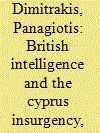

|
|
|
| 3 |
ID:
085565
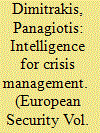

|
|
|
|
|
| Publication |
2008.
|
| Summary/Abstract |
Until today the January 1996 Greek-Turkish crisis over the sovereignty status of two Southeast Aegean islets remains the pick point of Greek-Turkish antagonism. In this article, the author assesses the role of Greek military intelligence during the crisis. He argues that Hellenic intelligence did not anticipate a confrontation with Turkey over two uninhabited islets. Eventually, the MoD mobilised a disproportionate number of ships in the Aegean to defend Greek sovereignty over the Imia islets. As the crisis unfolded, the Greek prime minister became frustrated by the inability of Greek intelligence services to confirm a Turkish landing on the second Imia islet. The author shows that during the crisis hours of 31 January 1996, the lack of tactical intelligence on Turkish deployment had a direct impact on the assessment of the operational status of the Greek armed forces and on the planned crisis response. Ultimately, rather than causing an acute sense of vulnerability, fear, and an aggressive response, the lack of intelligence led to a de-escalation of the crisis.
|
|
|
|
|
|
|
|
|
|
|
|
|
|
|
|
| 4 |
ID:
114258
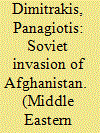

|
|
|
|
|
| Publication |
2012.
|
| Summary/Abstract |
From the outset the Soviet invasion of Afghanistan was strongly condemned by Britain and all the other NATO member states, by the non-aligned group and by key countries in Asia and the Middle East. During the first days following the invasion, London worked for the speedy build-up of a diplomatic consensus, while the Carter administration was still in a state of surprise and some confusion. It is evident that the single factor that led many countries to join forces diplomatically was the fear of further Soviet adventurism in Asia and the Middle East; uninformed, alarmist assessments of Soviet intentions played a major part in cementing a diplomatic coalition, which led to the condemnation of Moscow in the UN General Assembly - predictably, the Soviets had vetoed a Security Council resolution. Simply put, the fear of war led to something of a panic among non-aligned nations, which in turn convinced them to back western diplomacy.
|
|
|
|
|
|
|
|
|
|
|
|
|
|
|
|
| 5 |
ID:
090125
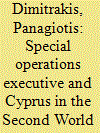

|
|
|
|
|
| Publication |
2009.
|
| Summary/Abstract |
Cyprus, together with Gibraltar and Malta, constituted the 'crown jewels' of British sea power in the Mediterranean during the Second World War. Being deployed on Cyprus the Royal Navy and the Royal Air Force could fight the Germans and Italians in the Southeast Mediterranean, thus inhibiting the continuous supply with troops and war material of the Africa Corps of Field Marshall Ervin Rommel. This article aims to shed light on the activities of the Special Operations Executive on the island. Citing recently declassified files we assess the espionage and propaganda as well as the guerrilla warfare contingencies in case of an Axis invasion of Cyprus. We provide a critical assessment of the British guerrilla warfare strategy, arguing that the SOE and the 25th Army Corps based on Cyprus had not been well prepared to counter aggression due to inter-service rivalries, bad planning and lack of manpower. Besides, the SOE distrusted the Greek-Cypriots and the Turkish-Cypriots to the extent that the training of guerrillas was planned to commence only after a successful invasion and the occupation of the island. Finally, SOE officers considered the Cypriot communists with their anti-colonialist declarations as another threat to be confronted with special operations.
|
|
|
|
|
|
|
|
|
|
|
|
|
|
|
|
| 6 |
ID:
090405


|
|
|
|
|
| Publication |
2009.
|
| Summary/Abstract |
The British sovereign bases on Cyprus, granted with the 1960 treaty establishing the Republic of Cyprus, played a key role in maintaining the fragile military structure of the Central Treaty Organization (CENTO). Although Britain and the United States urged the alliance to play a more active role, CENTO degenerated into an organization with no assigned forces with the exception of RAF bombers carrying nuclear weapons, stationed on Cyprus. Thus, Britain's contribution in political and military terms became vital for CENTO's deterrence capability. The Shah of Iran, one of the key regional leaders, was interested in the RAF bombers on Cyprus; the FCO and the MoD were always cautious over how force restructuring would be presented to the Iranians. Eventually, the need for cutting defence spending for non-NATO purposes made Whitehall decide in 1975 to withdraw the bombers permanently based in Cyprus. Britain could not be the only power paying for this 'alliance of the unwilling', as CENTO could be called with the benefit of hindsight. In 1976, Whitehall started scaling down financial support of military exercises; by 1983 they had planned to spend nil on the alliance. The British disengagement policy proved the correct one since this alliance had only a few years of life left. After the fall of the Shah, CENTO collapsed in 1979.
|
|
|
|
|
|
|
|
|
|
|
|
|
|
|
|
|
|
|
|
|